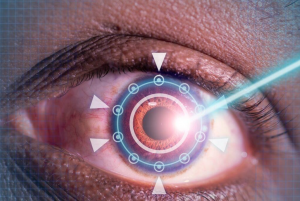6 Common Myths About Vision
Still think that if you eat a lot of blueberries, you can restore visual acuity? Or that eye gymnastics will save you from myopia?
Myth №1. Gadgets ruin your eyesight.
There is a common belief that smartphones, tablets, laptops and e-readers greatly damage vision, as they “irradiate”. In fact, of course, nothing of the kind happens, because the radiation of any household appliance complies with sanitary standards, and they all undergo mandatory certification.
What is really bad for the eyes is the size of the screen and the font – the smaller it is, the more eye strain. In addition, you can not read or watch movies from a tablet, smartphone, while in a room with the lights off, or read in transport. This is really damaging to the eyes.
Myth №2. Preparations with blueberries will return visual acuity with farsightedness.
“Blueberry” tablets are not inherently vitamins, but belong to the category of nutritional supplements. Be sure to remember that food supplements in our country are not approved for use in medical practice by the Pharmacological Committee of Russia (unlike multivitamin complexes). This means that clinical trials of “blueberry” tablets in ophthalmology have not been conducted. In addition, pathologies do not develop with farsightedness, so the appointment of multivitamins does not play a decisive role in the treatment of this disease.
Myth №3. Carrots improve visual acuity.
Undoubtedly, carrots contain vitamin A, which is so necessary for the proper functioning of the retina. But where did the opinion come from that carrots are a panacea? This myth was born at the beginning of the Second World War and was associated with the Nazi bombing of the UK.
To latest development – airborne radars, which were successfully used by the Royal Air Force of Great Britain, in secret, it was decided to come up with a version to explain the reflection of German attacks. “Revelations” of representatives of the air force appeared in the media, which all boiled down to one thing: ace pilots eat a lot of carrots, and this helps them to see in the dark better.
The Nazis have long been defeated, but the recommendation to lean on carrots to improve visual acuity remains. By the way, the beta-carotene contained in carrots can really be useful for night blindness. But carrots, alas, will not increase visual acuity.
Myth №4. Gymnastics for the eyes – salvation from myopia.
This is again a mediocre waste of time: the eye cannot be “pumped up” like legs or arms in the gym. If you have myopia, hyperopia, astigmatism, then exercises that make you move your eyes in different directions in no way can restore visual acuity to a patient with an anomaly that refractive powers of the eye.
Exercise, training – these terms can in no way be associated with the treatment of eye diseases. This is as absurd as the treatment of inflammation of the lungs, gastritis or hearing loss by training. There are no eye exercises!
Myth №5. Laser correction is only for adults.
Recent developments allow children as early as 10 years of age to undergo laser correction, which can save your child from further wearing glasses during their school years. This is great news for children with intolerance to glasses or contact lenses, as well as for babies with a large difference in refractive power between the eyes (from two diopters), when one eye is farsighted and the other is nearsighted.
There is only one “but”: there should be no progressive myopia! The operation is possible only in case of stabilization of myopia under the supervision of the attending ophthalmologist for three years.

Myth №6. Points “in a hole” (“LaserVision”) will save you from any problems.
Everywhere you can find these days on sale the so-called “hole” glasses, which are advertised as a cheap, simple and effective remedy for the treatment of many eye diseases, including farsightedness. Improvement after wearing these glasses disappears immediately, but does not last, because glasses in the “hole” do not have a scientifically proven therapeutic effect. Yes, they do no harm, but the time spent on wearing such glasses is lost forever, because proper therapy was not carried out.
Corrective glasses “LaserVision” do not apply to therapeutic agents. Glasses of this type are not even advertised as part of the corrective component of an extensive treatment plan for diseases such as myopia, hyperopia and amblyopia, but as a painless and eye-friendly remedy. An optical device can lead to a short-term improvement effect, work like a placebo, but does not really help.
For premium readers







